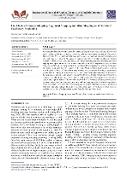The Effects of Concept Mapping, Argument Mapping and Mind Mapping on 6th Graders’ Vocabulary Production

Autor
Keysan, Flora
Norouzi Larsari, Vahid
Datum vydání
2022Publikováno v
International Journal of Applied Linguistics and English LiteratureRočník / Číslo vydání
11 (4)ISBN / ISSN
ISSN: 2200-3592ISBN / ISSN
eISSN: 2200-3452Metadata
Zobrazit celý záznamKolekce
Tato publikace má vydavatelskou verzi s DOI 10.7575/aiac.ijalel.v.11n.4p.20
Abstrakt
As vocabulary is an important element in enhancing English knowledge, utilizing effective and novel vocabulary learning strategies help foster learners' vocabulary production. The aim of this study is to present mapping techniques such as concept mapping, argument mapping, and mind mapping as innovative strategies to increase students' vocabulary production. Several studies have been carried out on the impacts of concept mapping, argument mapping, and mind mapping techniques but there is no obvious comprehension of the supremacy of any of these strategies over the others. The present study investigated the impacts of the selected techniques on vocabulary production of 6th Graders. To this end, 90 female students (6th graders) studying in an English institute in Tehran, Iran were selected and categorized into three experimental groups. Each of these groups received one of the chosen techniques randomly. At the end of the instructional sessions, one post-test designed in fill-in-the-blanks format was performed to evaluate vocabulary production of the students. A One-Way ANOVA procedure was utilized to analyse the acquired results. The outcomes showed that the obtained differences between the groups of concept mapping, argument mapping and mind mapping were statistically significant. Those participants who used the concept mapping and mind mapping techniques performed better than their classmates of the argument mapping technique. It is worthy to note that learners, teachers, and materials' designers can benefit from the findings of this study.
Klíčová slova
Concept Mapping, Argument Mapping, Mind Mapping, Vocabulary Production, ANOVA
Trvalý odkaz
https://hdl.handle.net/20.500.14178/2461Licence
Licence pro užití plného textu výsledku: Creative Commons Uveďte původ 4.0 International

